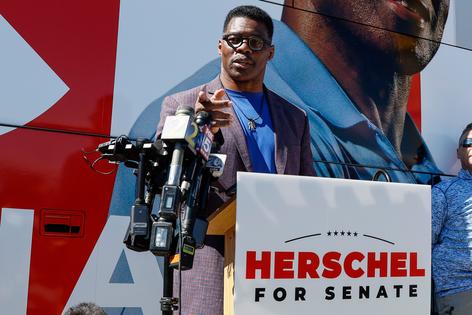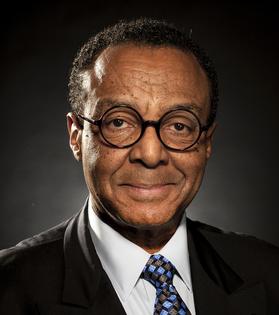Is Ye, Kanye West, the New Face of Black Conservatism? How About Herschel Walker?
Senate Republican Leader Mitch McConnell raised more than a few eyebrows when he criticized “candidate quality” in his own party’s field as a major obstacle to flipping the now-50-50 Senate back to Republican control.
That’s a nice way of saying too many of their candidates have serious electability issues. They appeared to be flawed, too extreme or too inexperienced to win mainstream voters.
I have long raised similar questions about shakiness in the quality of rising Black conservative voices.
Take, for example, Georgia Senate Republican candidate Herschel Walker. Please.
The deservedly popular figure in football may have scored big for the University of Georgia and in the pros. But as an icon of family values, he’s no Booker T. Washington.
On the campaign trail, Walker has made headlines by trying to push back a steady stream of reports that he exaggerated his professional, academic and civic success, most recently in a televised debate in which he presented an honorary badge with no legal powers as evidence he had worked in law enforcement.
Also damaging were his acknowledgments that he fathered children he did not previously disclose, and his ex-girlfriend’s claim that he paid for her to have an abortion, despite his endorsement of a no-exceptions ban on abortion.
Yet, despite the scandals, his race against his incumbent opponent, Sen. Raphael Warnock, remained too close in the polls to count Walker out.
Ye, by contrast, isn’t running for office, despite his past announcements of considering a presidential run. For now, he’s raised his profile on the political right by agreeing this week to buy Parler, a social media app where right-wing trolls go to flame each other in their own version of unfettered “free speech.” Fun.
The Parler move was announced after Ye was kicked off Twitter and Instagram for antisemitic tweets — and after he met by phone with former President Donald Trump. Yet even some Trump loyalists slammed the comments. “I admire Kanye in many ways,” wrote Matt Schlapp, head of the very influential Conservative Political Action Coalition (CPAC). “But his harsh comments of Jews are offensive and wrong. Unite and Fight.”
True enough. I was reminded of how Booker T. Washington, the iconic Black conservative who founded the Tuskegee Institute, and Chicago’s Julius Rosenwald, philanthropist and president of Sears Roebuck, built thousands of state-of-the art schools for African American children — including some of my cousins — across the South during the Jim Crow era.
Washington was the epitome of a Black conservative movement that emphasized traditionalism, patriotism, self-sufficiency, and strong cultural and social conservatism within the context of the Black church. The movement helped bring near-solid Black support to the Republican Party that lasted until Franklin D. Roosevelt in the 1930s and Lyndon Johnson in the civil rights revolution of the 1960s.
The “Party of Lincoln” lost most of its loyal Black following in the years that followed Southern backlash against the civil rights revolution, as well as numerous other people of color turned off by the rise of Trump’s presidency.
But this year, a new trend has appeared without a lot of fanfare as 22 Black candidates are running as Republicans for House seats in the midterms. Overall, a record number of 67 Black, Latino, Asian or Native American candidates are slated to appear on the November midterms ballot, by the Grand Old Party’s count — compared with only a dozen current House members of color.
Already some in the party are reviving dreams of Ronald Reagan’s vision of an inclusive “Big Tent” party rising up from the ashes of past racial polarization. But the cultural, historical and political divide that Trump and his loyal following have generated against the more urban and diverse Democrats will endure unless both sides make stronger efforts to bring them together.
Republicans this year, for example, have made crime and inflation their biggest issues. That’s OK on the face of it. But on tough issues like crime, the two parties remain far apart. The left tends to push bail reform and better police-community relations, while the right wants to throw more bodies in jail, even for nonviolent offenses.
That’s a tragedy for any real, durable progress. But election years, ironically enough, tend to be a terrible time to entertain serious ideas. We’re too busy, it seems, following the celebrities and the tweets.
========
(E-mail Clarence Page at cpage@chicagotribune.com.)
©2022 Clarence Page. Distributed by Tribune Content Agency, LLC.
(c) 2022 CLARENCE PAGE DISTRIBUTED BY TRIBUNE MEDIA SERVICES, INC.










